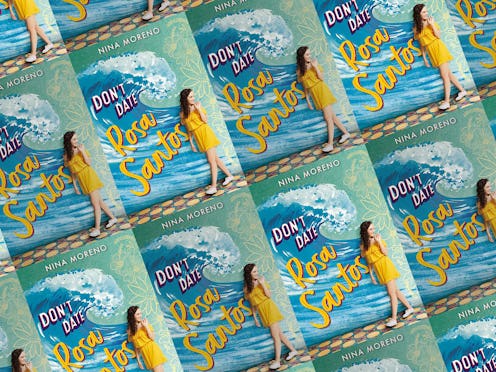Books
In 'Don't Date Rosa Santos,' I Saw My Own Experience Laid Bare

Bustle's I'm So Jealous series is dedicated to the books, TV shows, movies, podcasts, and more that super fans are so jealous someone else gets to experience for the first time. In this installment, Kerri Jarema writes about Nina Moreno's Don't Date Rosa Santos.
My abuela made arroz blanco especially for me.
In most of my memories of her, Abuela is standing in the small kitchen of her Lower East Side apartment, wielding her own unique magic with pots and pans, meats and spices. To walk into that apartment was to be enveloped in warmth — not only from the oven, constantly churning out platters of roasted pernil or baked pollo al horno, but from my abuela herself, who welcomed everyone in with open arms and full plates.
My abuela, Lydia, came to New York City from Bayamón, Puerto Rico when she was in her early twenties. She lived here for almost 50 years, raised seven children as a single mother, and fed her ever-growing family with endless dishes of soul-nourishing food. Her full story, though, is something of a mystery to me, lost to time and family secrets. It's been 21 years since I was that picky eater who didn't quite trust what made arroz amarillo so yellow, who got a bowl of buttery, savory, fluffy white rice cooked just for me.
And it's only now that I've begun to worry about all the parts of my abuela I don't know, and all the parts I might already be losing.
Rosa Santos, the heroine of Nina Moreno's 2019 YA debut, Don't Date Rosa Santos, is experiencing a similar reckoning. Rosa, who lives in the small coastal town of Port Coral, has always been told that the women in her family are cursed to lose their loves at sea. But with college looming, she feels more trapped than cursed. She is caught between her abuela — a beloved pillar of their community — and her mother — an artist who crashes in and out of her life. She is stuck between Port Coral and Cuba, the island Rosa has never seen and her abuela refuses to talk about. And she is cornered between the hope of new love and the specter of tragic family history.
Many people feel fraught about their identity, but especially those of us who feel ni de aqui, ni de allá — neither here, nor there. Like Rosa, I have never seen the island where my abuela was born and raised. I don't speak fluent Spanish, my abuela's native language. I was just nine when my abuela passed, too young to think of all the questions I would have for her at 30, when it would be too late to ask. And like Rosa, though I grew up in a primarily Latinx neighborhood, I always felt slightly apart from my peers who visited their ancestral islands every summer, whose tongues seemed so easily bilingual, whose grandmothers are still here to tell their own stories.
In Don't Date Rosa Santos, I saw my experience laid bare: Rosa is never sure if she is "Cuban enough" or what that even means, she longs to connect with the parts of her heritage that seem just out of reach, and she knows that her abuela's past might always remain hidden behind a veneer of her special grandmotherly magic (like mine, Rosa's abuela uses pots and pans to serve the people in her life, though her healing comes in the form of tinctures and salves, where my abuela's came in plates of steaming maduros).
But the most beautiful thing about Rosa's journey, and mine, is coming to the realization that we are both our abuela's granddaughters, our mother's daughters. Our stories are woven together through time and place, a narrative neverending. I will never see Bayamón as it was when my abuela lived there. I will never taste my abuela's special white rice again. My questions for her will remain unanswered. But her blood still runs through my veins, and her magic still lingers on my tongue, seasoning the words I use every day to speak our shared history into existence.
If you're picking up Don't Date Rosa Santos for the first time: You might want to set aside some time to call up a few of your beloved female family members or friends to tell them how much you love them because you are going to be dealing with some serious feels at the end of this one.
If you love it and want more of the same: You can't go wrong with Elizabeth Acevedo's 2019 YA novel, With the Fire on High, which also features a fierce abuela, a shared love of cooking, and celebration of Latinx culture.
And if this book converts you into a member of the Nina: Her second novel, Our Way Back to Always, returns to Port Coral for a new adventure about next-door neighbors and ex-best friends Luisa and Sam, whose paths collide during senior year of high school. The book is expected to hit shelves in 2021.
This article was originally published on